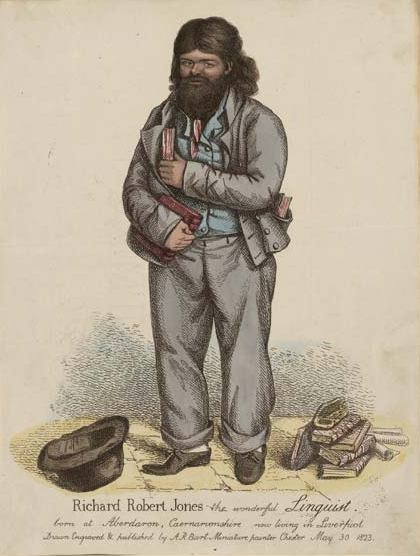Dic Aberdaron on:
[Wikipedia]
[Google]
[Amazon]
 Dic Aberdaron (Richard Robert Jones; 1780–1843), also known as Dick of Aberdaron, was a Welsh traveller and
Dic Aberdaron (Richard Robert Jones; 1780–1843), also known as Dick of Aberdaron, was a Welsh traveller and
BBC article
Linguists from Wales 1780 births 1843 deaths People from Aberdaron {{Wales-academic-bio-stub
 Dic Aberdaron (Richard Robert Jones; 1780–1843), also known as Dick of Aberdaron, was a Welsh traveller and
Dic Aberdaron (Richard Robert Jones; 1780–1843), also known as Dick of Aberdaron, was a Welsh traveller and polyglot
Multilingualism is the use of more than one language, either by an individual speaker or by a group of speakers. It is believed that multilingual speakers outnumber monolingual speakers in the world's population. More than half of all Eu ...
.
Life
Aberdaron was born in 1780 in the coastal town of Aberdaron with the herbalist Alice Griffith as midwife. He had little or no formal education, but was reputed to have taught himself 14 or 15 languages, both ancient and modern, including Latin at the age of 11. Aberdaron's Welsh, Greek and Hebrew dictionary is now kept at St Asaph Cathedral. He is buried in the parish church ofSt Asaph
St Asaph (; cy, Llanelwy "church on the Elwy") is a city and community on the River Elwy in Denbighshire, Wales. In the 2011 Census it had a population of 3,355, making it the second-smallest city in Britain in terms of population and urban ...
, north Wales
Wales ( cy, Cymru ) is a country that is part of the United Kingdom. It is bordered by England to the east, the Irish Sea to the north and west, the Celtic Sea to the south west and the Bristol Channel to the south. It had a population in ...
. William Roscoe
William Roscoe (8 March 175330 June 1831) was an English banker, lawyer, and briefly a Member of Parliament. He is best known as one of England's first abolitionists, and as the author of the poem for children ''The Butterfly's Ball, and the G ...
, the writer, wrote a ''Memoir'' of him and the Welsh poet R. S. Thomas, who was once the vicar of Aberdaron, wrote a poem about him, simply titled ''Dic Aberdaron''. T. H. Parry-Williams
Sir Thomas Herbert Parry-Williams (21 September 1887 – 3 March 1975) was a Welsh poet, author and academic.
Parry-Williams was born at Tŷ'r Ysgol (''the Schoolhouse'') in Rhyd Ddu, Caernarfonshire, Wales. He was educated at the University ...
wrote a somewhat different poem with the same title in Welsh, stressing his eccentricity and the pointlessness of his learning, since he never appears to have used any of his languages, but concludes: "Chwarae-teg i Dic – nid yw pawb yn gwirioni'r un fath" (Fair play to Dic – not everybody is silly in the same way).
Notes
External links
*BBC article
Linguists from Wales 1780 births 1843 deaths People from Aberdaron {{Wales-academic-bio-stub